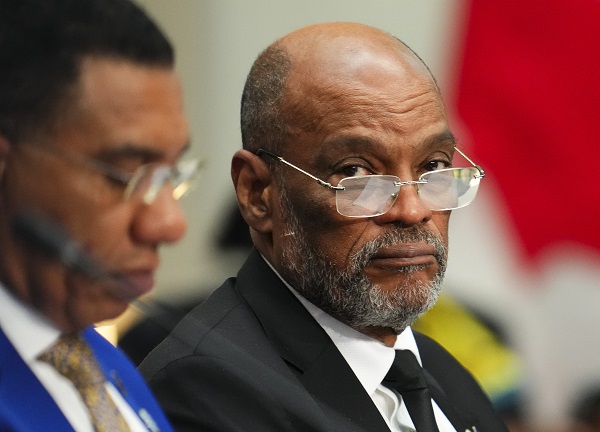headline news online news
By Jacqueline Charles
Miami Herald
(Miami Herald) A former presidential candidate and head of the Senate was selected Tuesday to head Haiti’s new nine-member transitional presidential council in a deal that also designated a former minister of public works as Haiti’s next prime minister. online news
Edgard Leblanc Fils, 68, was named president of the transitional presidential council shortly before noon and nearly two hours behind a scheduled vote, following an agreement between the majority of the panel’s seven voting members. The same majority then selected Fritz Bélizaire, a one-time minister of public works, as prime minister to replace the outgoing Ariel Henry.
“We can discuss, negotiate, make concessions and arrive at a result,” Leblanc said.
The surprise turn of events occurred after the political groups on the council switched their last-minute support from former Sen. Louis Gérald Gilles, who represents the December 21 coalition on the panel, and cemented a deal backed by Gilles, the political party Pitit Desalin and the coalition known as EDE/RED/Compromis Historique.
An engineer and co-founder of the Organization of the People in Struggle, Fils is part of a collective of political parties whose membership includes PHTK, the political party of former President Michel Martelly. He was president of the Haitian Senate from 1995 to 2000 during the first administration of President of René Préval. Bélizaire, who is also an engineer, served as public works minister 2007-08, during Préval’s second presidential term.
Fils said there was a two-hour delay because council members were engaged in negotiations to reach a vote by a majority and “the acceptance of this exercise proves that we can.”
“We believe in the council,” Fils said in remarks following the announcement he had been selected president. “The first thing that is important for us is cohesion among us; political will and determination to overcome conflicts and arrive by consensus, and at times, discussions and negotiations… to free the country from actions that have created a lot of suffering and victims.”
Brokered by an international coalition led by the 15-member bloc known as CARICOM. the new transitional presidential council has a tough road ahead. More than two months after a united front of armed gangs began targeting the airport, prisons, police stations, seaport and other key government structures in the capital, Port-au-Prince remains under siege and paralyzed. More than 2,500 Haitians have died or been injured since the start of the year, millions are going hungry and thousands have fled to cities outside the capital or displacement camps around the capital.
Under a political accord agreed upon among their sectors and political parties, council members have until February 2026 to provide Haiti with a newly elected president, parliament, local representatives and possibly a new constitution. But to get there, they have to form a new cabinet of ministers and ready the country to receive the deployment of a multinational security force led by Kenya to help restore security.
They also have to convince Haiti’s population of 12 million population that they can bring about change for the better.
On paper, Fils is supposed to be nothing more than a coordinator, someone to help the council prioritize and focus on the litany of challenges ahead — restoring security and the economy, and taking Haiti to new elections, as well as providing a signature for accords, go abroad for meetings and receive heads of state.
But in the minds of the council members, four of whom had presented their own candidacies, the role had been viewed as if it were a real presidency, having much more power than what is written in the political accord about how the group is to function.

Ahead of Tuesday’s announcement, council members and their political parties and sectors were engaged in heavy behind-the-scenes discussions and lobbying that saw the old political guard and the country’s powerful private sector at loggerheads over who should lead the council, and who would cement the 4-3 voting majority needed to adopt policies.
How Tuesday’s decision will be received by the public remains to be seen. Two sources told the Miami Herald that the key behind Tuesday’s decision is Jean-Charles Moïse, the firebrand former senator and leader of the Pitit Desalin political party. Moïse had initially refused to participate in the panel after being invited to do so by Caribbean leaders.
Since joining the council, he has emerged as a key player, building an alliance with former foreign minister and prime minister Claude Joseph, whose EDE/RED/Compromis Historique coalition is represented on the council. Going into the vote on Tuesday, Moïse had asked council members to sign a document supporting Bélizaire as prime minister to replace Henry, who stepped down last week.
Bélizaire was handpicked by Moise and his selection ran counter to the open process the council announced it would launch to choose the next head of Haiti’s government.
While Tuesday’s decision marks progress in a process that began on March 11 — when Caribbean leaders met in Jamaica to help Haitians find a political deal as marauding gangs threatened the collapse of the government — it is also the second time in a week that council members announced plans to do one thing and in the end did something else. Ahead of last week’s swearing in of the council, members said the venue would be the old prime minister’s office, Villa Accueil, and not the presidential palace.
It turned out they were sworn in at the presidential palace anyway, a decision that had been decided two days earlier and as they embarked on a misleading press tour. This week, they again turned to the media, inviting journalists to come observe the voting. They published rules and even had two ballot boxes waiting.
Then after two hours, Frenel Joseph, one of two non-voting observers emerged to announced there had been a change of plans. He then named Fils and later Bélizaire.
©2024 Miami Herald. Visit at miamiherald.com. Distributed by Tribune Content Agency, LLC.
headline news online news


